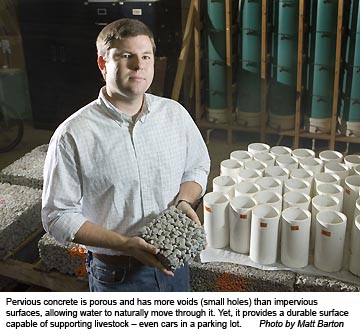UK Ag Student Studies Merits of Environmentally Beneficial Concrete
UK Ag Student Studies Merits of Environmentally Beneficial Concrete


Paved surfaces are so commonplace that many people don’t think about how they affect the environment. A University of Kentucky College of Agriculture graduate student is studying how a form of porous, or “pervious,” concrete could benefit rural and urban areas.
“A lot of farmers use concrete on their property and they get a lot of runoff,” said Joe Luck, graduate student in UK’s biosystems and agricultural engineering department. “Pervious concrete could provide a durable surface for animals and equipment but also reduce runoff. And the neat thing about this (research) is, I think it could lead into using a product like pervious concrete to help remove some of those nutrients and pathogens before they get off the facility and get into the natural environment and cause some type of pollution.”
Taking several microbiology courses and seeing the effects of pollutants on the environment prompted Luck’s desire to study using pervious concrete as a way to protect the environment.
Luck, from Hanson, is working on his master’s degree under the direction of UK Bioenvironmental Engineering Professor Stephen Workman, who believes pervious concrete could be beneficial in urban settings as well.
“In light of the recent storm water problems in Lexington, this type of material would be great for parking lots and it allows water to go through rather than run off,” he said. “As far as agricultural applications, one of the key things is we don’t want to have nutrients leaving the farm. If we can have nutrients residing on top of the concrete and the liquid going through and being treated as it moves through, it will increase water quality.”
Pervious concrete is porous and has more voids (small holes) than impervious surfaces, allowing water to naturally move through it. Yet, it provides a durable surface capable of supporting livestock – even cars in a parking lot.
Luck and Workman’s research is in conjunction with the Kentucky Ready Mix Association, Steve Higgins in BAE and Mark Coyne in the in the UK Department of Plant and Soil Sciences.
Recently the Portland Cement Association chose Luck to receive one of only six educational fellowships awarded by the association’s education foundation. The $20,000 award helped Luck purchase materials to further his research and begin to publish the results.
“My goal is to maybe provide a new way of treating effluent from animal confinement facilities and animal operations, which we have a lot of in Kentucky,” Luck said. “That’s one of the major reasons for this research – to see if there may be a way for farmers and even large corporations to help reduce pollution.”
